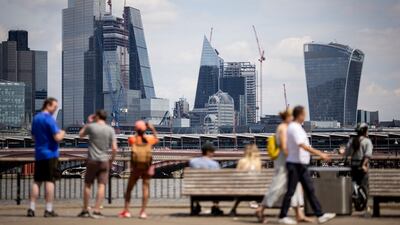Bank of England governor Andrew Bailey warned on Friday against workers trying to “beat inflation” by seeking hefty pay rises that he said would prolong the dramatic rise in prices.
Amid a drumbeat of strikes and discontent from some MPs at the Bank's failure to prevent runaway inflation, Mr Bailey said raising wages as demanded by unions would only make the problem worse.
Speaking to BBC Radio 4's Today programme, he said non-unionised workers without the bargaining muscle to demand higher pay would be worst affected if inflation gets out of control.
He defended the Bank's policies a day after interest rates were increased to 1.75 per cent and inflation was predicted to rise to 13 per cent this year, the highest level in decades.
A recession is expected this year and real incomes are projected to “fall sharply” in 2022 and 2023.
Although Mr Bailey said inflation was mainly being driven by external shocks, especially the energy crisis unleashed by Russia's invasion of Ukraine, he said increasing interest rates to slow the rise in prices would stop inflation becoming unshakeable.
“We don’t know what Vladimir Putin will do next. We’re seeing he’s severely restricting the supply of gas to Europe and that is having a huge effect. The risk is that the inflation becomes embedded and it doesn’t come down,” he said.
“If everybody tries to beat inflation, and that’s in both price setting and wage setting, it doesn’t come down, it gets worse. In that world, it’s the people who are least well off who are worst affected because they don’t have the bargaining power.”

The economic strife is playing out against the backdrop of the Conservative leadership election, which will decide who becomes prime minister as Britain heads into a difficult winter.
The problems are exacerbated by high food prices and labour shortages resulting from the coronavirus pandemic, in which some industries laid off workers only to now find themselves short.
Some Conservative MPs have lashed out at the Bank of England for acting too late, as they see it, to prevent high inflation that has been on the cards for months.
“The Bank of England have been asleep at the wheel,” said Tory MP Andrew Bridgen.
Suella Braverman, the attorney general and a prominent supporter of leadership candidate Liz Truss, said a Truss government would review the Bank's mandate and independence on interest rates.
She told Sky News there was no suggestion of completely revoking the Bank's autonomy, which was granted under a Labour government in 1997, but that “there are many other models around the world where central banks have different degrees of independence”.
Conservative leadership race — in pictures
Mr Bailey would not be drawn on the leadership contest but said he was willing to discuss the Bank's regime with whoever is elected prime minister.
However, he said the independence of the central bank was “critically important” and that he did not see any “large desire in this country” to call it into question.
Ms Truss, who is ahead of former chancellor Rishi Sunak in the Tory leadership polls, said she thought a recession was not inevitable as she pitched various pro-growth policies to members.
Former chancellor Mr Sunak said his opponent's “premature tax cuts” would only exacerbate inflation.












































































